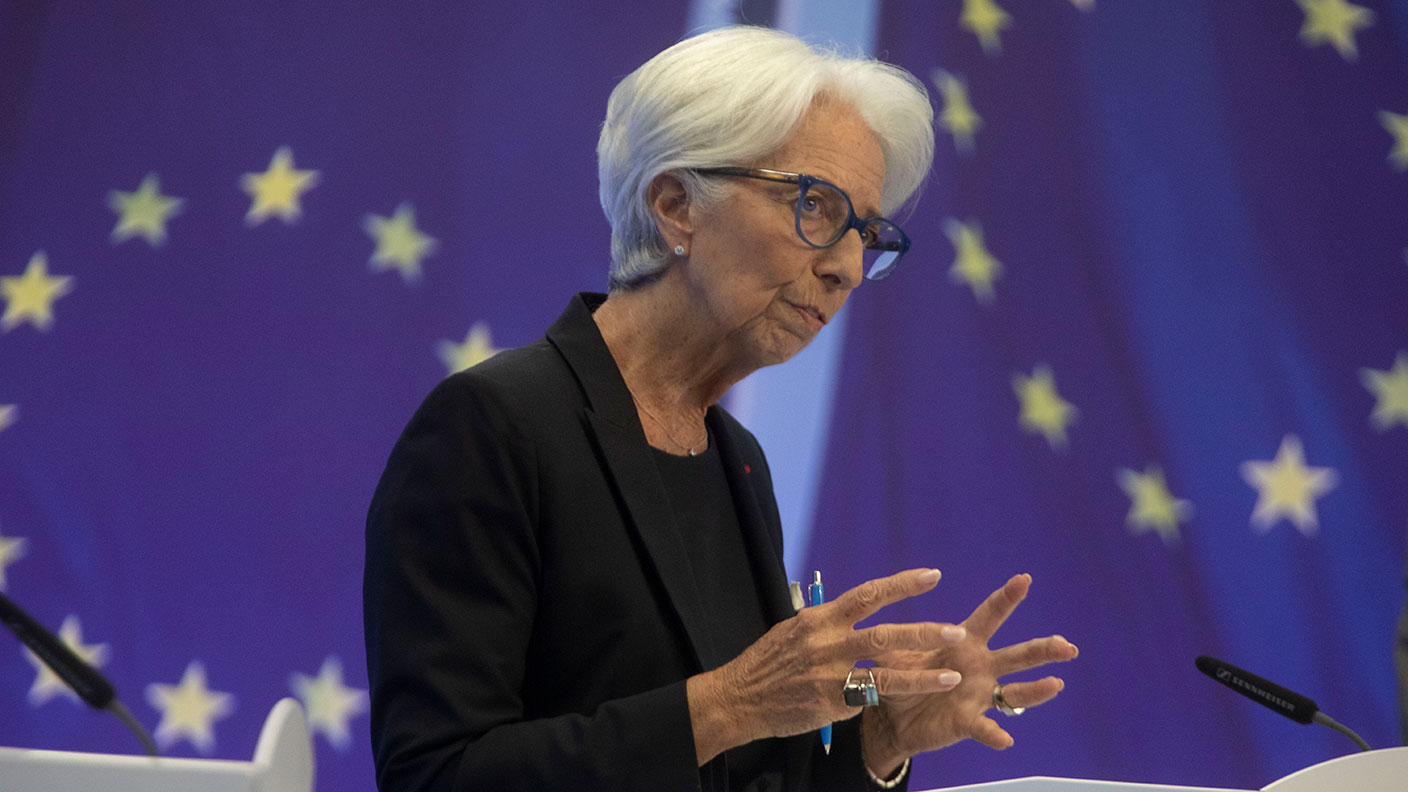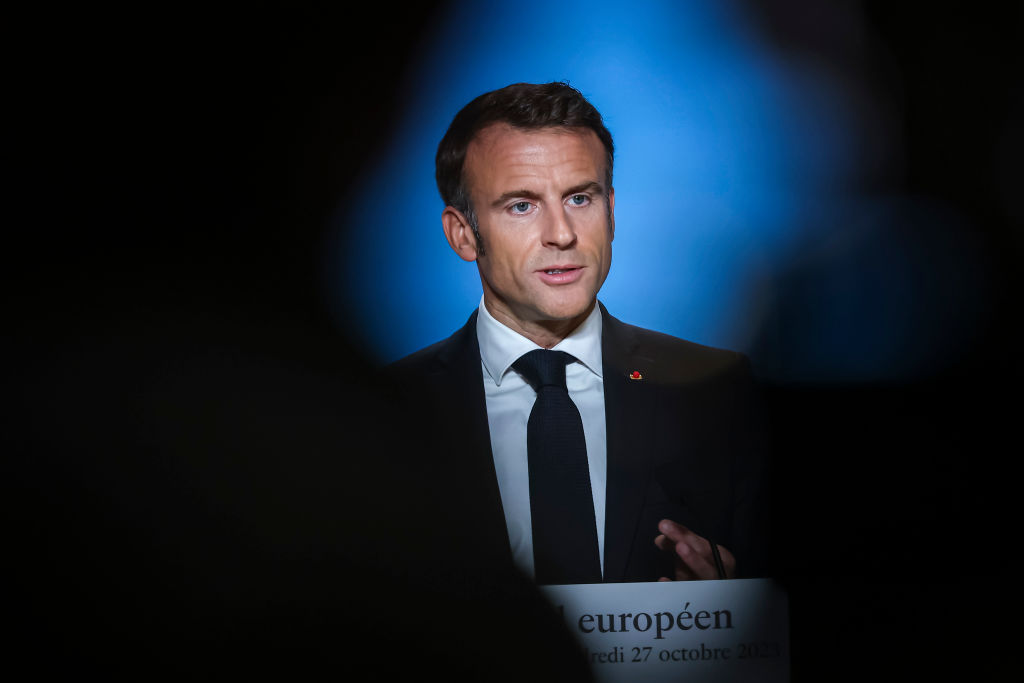“Whatever it takes” is no longer enough to shield the euro
The European Central Bank raised interest rates for the first time in more than a decade on Thursday, officially marking the end of negative interest rates. John Stepek breaks down what it means for the euro.


Get the latest financial news, insights and expert analysis from our award-winning MoneyWeek team, to help you understand what really matters when it comes to your finances.
You are now subscribed
Your newsletter sign-up was successful
Want to add more newsletters?

Twice daily
MoneyWeek
Get the latest financial news, insights and expert analysis from our award-winning MoneyWeek team, to help you understand what really matters when it comes to your finances.

Four times a week
Look After My Bills
Sign up to our free money-saving newsletter, filled with the latest news and expert advice to help you find the best tips and deals for managing your bills. Start saving today!
The European Central Bank (ECB) raised interest rates for the first time in more than a decade yesterday.
The rate rise was also bigger than markets had expected. The half-a-percentage-point rise means the eurozone interest rate is now 0%. Negative interest rates, perhaps the weirdest financial phenomenon of an admittedly very weird era, are rapidly becoming extinct.
However, while markets were certainly interested in the rate hike, what they were much more interested in was the ECB’s replacement strategy for “whatever it takes”.
MoneyWeek
Subscribe to MoneyWeek today and get your first six magazine issues absolutely FREE

Sign up to Money Morning
Don't miss the latest investment and personal finances news, market analysis, plus money-saving tips with our free twice-daily newsletter
Don't miss the latest investment and personal finances news, market analysis, plus money-saving tips with our free twice-daily newsletter
And, it has to be said, unlike the outsize rate hike, the new “transmission protection instrument” (TPI) didn’t do anything to beat expectations.
The eurozone’s fundamental problem is nowhere near being solved
Rising inflation and consequent rising interest rates are a problem for most parts of the world. But the eurozone has one big problem that sets it apart from everywhere else – the euro.
We ran through the history a couple of days ago, so you can read all that here. But the main problem for the euro can be summed up pretty quickly.
All four countries in the UK share a currency – sterling. But they also share the same government debt. No one looks at the individual creditworthiness of Scotland or Northern Ireland or Wales or England. The entity that does the borrowing is the UK. And in extremis, the UK can print more money to repay its debts. (This would have consequences – but it does mean that the UK never has to default on its debt, unless it explicitly chose to do so).
All 19 countries in the eurozone share a currency - the euro. But they each issue individual government debt. Germany borrows separately to Italy. German taxpayers and the German economy do not stand behind Italian government debt. The only thing that backs Italian government debt is Italy.
Also, in extremis, Italy cannot print more euros to repay its debts (and nor can Germany). So an actual default – where government bonds simply can’t be paid – is technically possible. As a result of this, if a eurozone country looks like it has a wobbly balance sheet, markets will drive up the interest rate on its debt, which makes the balance sheet even wobblier.
In turn, this all threatens the very existence of the single currency. Because if a country like Italy (or France) was in danger of defaulting on its debt, it would have to leave the eurozone. And if that happened, the euro would disintegrate.
The ultra-low interest rate world meant that none of this was an issue for a while. ECB interest rates were negative, and the ECB was also printing money to buy bonds, which enabled it to keep rates on the riskier borrowers under control.
That changes rapidly in a rising rate environment. Particularly because inflation not only heats up the economy but also heats up the political realm. Fuel price protests and the like put pressure on public finances (because people expect the government to spend money to “do something”).
Suddenly the threat of the riskier eurozone members seeing their borrowing costs driven up to unsustainable levels is becoming a danger again.
The TPI is designed to avoid this problem. However, as with most things in the eurozone, politics gets in the way.
The market is going to test the ECB’s resolve – again
The simple solution to preventing interest rates in the eurozone from diverging catastrophically, is for the ECB to just say it’ll print as much money as it likes to keep the yield on government debt issued by eurozone countries to within one percentage point (or whatever) of the lowest comparable rate paid by any member state.
In other words, “we won’t let Italian government bonds yield more than a percentage point above German bunds”. There are potential economic issues here, of course. (Just ask the Bank of Japan how tricky fixing interest rates can be).
But the main problem here is political. The moral hazard is that countries which really need to reform their economies, instead don’t do anything because they know that however much they spend, the ECB will bail them out. And whether this is fair or truthful or not, it’s how German taxpayers will perceive it.
So the ECB has to somehow tell markets that it will definitely not let anything happen to the euro – that it will still do “whatever it takes” – while at the same time not issuing anything that looks like an unconditional guarantee by German taxpayers to pay for Italian pension schemes.
That’s a really tricky line to walk. You have to be vague, but threatening.
So on the one hand, ECB boss Christine Lagarde said that the decision to intervene was at the ECB’s discretion and that any such intervention would be unlimited and could also extend to private sector assets. That sounds pretty aggressive.
But the document also mentioned a series of conditions a country would have to meet before getting this sort of assistance. This includes things like “sustainable macro policies” and several other lines which add up to an attempted reassurance to Germany that this is not a free lunch for non-German eurozone countries.
In short, it’s subject to all the contradictions that any eurozone policy is subject to. It’s an attempt to patch up the gaping holes left by a lack of political union using monetary policy by the backdoor.
Will it work? Markets were not especially inspired. The euro has barely shifted against the dollar, which given that the rate hike surprised on the upside, is not a vote of confidence in the policy. And the gap between the yield on Italian bonds and German bunds is still significant.
I think the long and the short of it is that this may not ever be tested out as there are other mechanisms with which to control the spread in extremis. But it’s also clear that the market is likely to test the ECB’s resolve over this.
And with the political situation in Italy getting more chaotic as Mario Draghi’s era comes to an end, and the wider eurozone economic outlook getting weaker and more stagflationary, it’s probably only a matter of time before another crisis erupts.
Get the latest financial news, insights and expert analysis from our award-winning MoneyWeek team, to help you understand what really matters when it comes to your finances.

-
 Should you buy an active ETF?
Should you buy an active ETF?ETFs are often mischaracterised as passive products, but they can be a convenient way to add active management to your portfolio
-
 Power up your pension before 5 April – easy ways to save before the tax year end
Power up your pension before 5 April – easy ways to save before the tax year endWith the end of the tax year looming, pension savers currently have a window to review and maximise what’s going into their retirement funds – we look at how
-
 How have central banks evolved in the last century – and are they still fit for purpose?
How have central banks evolved in the last century – and are they still fit for purpose?The rise to power and dominance of the central banks has been a key theme in MoneyWeek in its 25 years. Has their rule been benign?
-
 What's behind the big shift in Japanese government bonds?
What's behind the big shift in Japanese government bonds?Rising long-term Japanese government bond yields point to growing nervousness about the future – and not just inflation
-
 Do we need central banks, or is it time to privatise money?
Do we need central banks, or is it time to privatise money?Analysis Free banking is one alternative to central banks, but would switching to a radical new system be worth the risk?
-
 The French economy's Macron bubble is bursting
The French economy's Macron bubble is burstingCheap debt and a luxury boom have flattered the French economy. That streak of luck is running out.
-
 The Bank of England can’t afford to hike interest rates again
The Bank of England can’t afford to hike interest rates againWith inflation falling, the cost of borrowing rising and the economy heading into an election year, the Bank of England can’t afford to increase interest rates again.
-
 UK wages grow at a record pace
UK wages grow at a record paceThe latest UK wages data will add pressure on the BoE to push interest rates even higher.
-
 Trapped in a time of zombie government
Trapped in a time of zombie governmentIt’s not just companies that are eking out an existence, says Max King. The state is in the twilight zone too.
-
 America is in deep denial over debt
America is in deep denial over debtThe downgrade in America’s credit rating was much criticised by the US government, says Alex Rankine. But was it a long time coming?